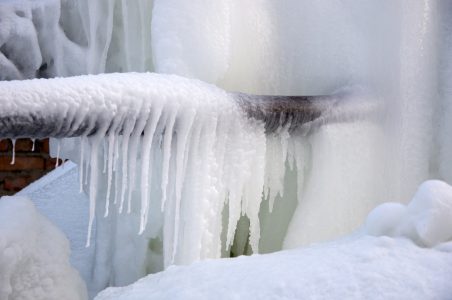Preventing Frozen Pipes: Best Methods for Cold Weather
Preventing Frozen Pipes: Best Methods for Cold Weather
Blog Article
They are making a number of good pointers regarding How to prepare your home plumbing for winter weather in general in the content in the next paragraphs.
.jpg)
Cold weather can ruin your plumbing, particularly by freezing pipelines. Below's exactly how to avoid it from taking place and what to do if it does.
Intro
As temperatures decline, the danger of icy pipes rises, potentially resulting in expensive fixings and water damage. Comprehending exactly how to stop frozen pipelines is important for homeowners in cool environments.
Understanding Frozen Pipelines
What causes pipes to ice up?
Pipes ice up when exposed to temperatures below 32 ° F (0 ° C) for prolonged durations. As water inside the pipelines ices up, it broadens, putting pressure on the pipeline wall surfaces and potentially creating them to rupture.
Threats and problems
Frozen pipelines can cause water interruptions, home damages, and costly fixings. Ruptured pipes can flood homes and create considerable architectural damage.
Signs of Frozen Piping
Recognizing frozen pipelines early can prevent them from bursting.
How to determine icy pipelines
Search for lowered water flow from taps, uncommon smells or sounds from pipes, and noticeable frost on subjected pipes.
Prevention Tips
Insulating susceptible pipelines
Cover pipes in insulation sleeves or utilize heat tape to shield them from freezing temperature levels. Concentrate on pipes in unheated or exterior locations of the home.
Heating strategies
Keep indoor spaces sufficiently heated up, particularly locations with pipes. Open cabinet doors to enable cozy air to flow around pipelines under sinks.
Securing Exterior Pipes
Yard hoses and outdoor faucets
Separate and drain pipes yard tubes before winter months. Mount frost-proof spigots or cover outdoor faucets with protected caps.
What to Do If Your Pipelines Freeze
Immediate activities to take
If you presume frozen pipelines, maintain taps available to eliminate stress as the ice melts. Use a hairdryer or towels soaked in hot water to thaw pipelines gradually.
Long-Term Solutions
Architectural modifications
Think about rerouting pipelines far from outside walls or unheated locations. Add additional insulation to attic rooms, cellars, and crawl spaces.
Updating insulation
Buy top notch insulation for pipes, attic rooms, and wall surfaces. Correct insulation helps preserve consistent temperatures and decreases the risk of icy pipes.
Verdict
Preventing frozen pipes calls for proactive measures and quick responses. By recognizing the reasons, indications, and preventive measures, house owners can protect their pipes during winter.
Helpful Tips to Prevent Frozen Pipes this Winter
UNDERSTANDING THE BASICS: WHY PIPES FREEZE AND WHY IT’S A PROBLEM
Water freezing inside pipes is common during the winter months, but understanding why pipes freeze, and the potential problems it can cause is crucial in preventing such incidents. This section will delve into the basics of why pipes freeze and the associated problems that may arise.
THE SCIENCE BEHIND FROZEN PIPES
When water reaches freezing temperatures, it undergoes a physical transformation and solidifies into ice. This expansion of water as it freezes is the primary reason pipes can burst. As the water inside the pipe freezes, it expands, creating immense pressure on the walls. If the pressure becomes too great, the pipe can crack or rupture, leading to leaks and water damage.
FACTORS THAT CONTRIBUTE TO PIPE FREEZING
Low Temperatures: Extremely cold weather, especially below freezing, increases the risk of pipes freezing. Uninsulated or Poorly Insulated Pipes: Pipes located in unheated areas, such as basements, crawl spaces, or attics, are more prone to freezing. Insufficient insulation or lack of insulation altogether exacerbates the problem. Exterior Wall Exposure: Pipes running along exterior walls are susceptible to freezing as they encounter colder temperatures outside. Lack of Heating or Temperature Regulation: Inadequate heating or inconsistent temperature control in your home can contribute to frozen pipes. PROBLEMS CAUSED BY FROZEN PIPES
- Pipe Bursting: As mentioned earlier, the expansion of water as it freezes can cause pipes to burst, resulting in significant water damage.
- Water Damage: When pipes burst, it can lead to flooding and water damage to your property, including walls, ceilings, flooring, and personal belongings.
- Structural Damage: Prolonged exposure to water from burst pipes can compromise the structural integrity of your home, leading to costly repairs.
- Mold and Mildew Growth: Excess moisture from water damage can create a favorable environment for mold and mildew growth, posing health risks to occupants.
- Disrupted Water Supply: Frozen pipes can also result in a complete or partial loss of water supply until the issue is resolved.
WHY CERTAIN PIPES ARE MORE PRONE TO FREEZING
- Location: Pipes located in unheated or poorly insulated areas, such as basements, crawl spaces, attics, or exterior walls, are at higher risk of freezing.
- Exterior Pipes: Outdoor pipes, such as those used for irrigation or exposed plumbing, are particularly vulnerable to freezing as they are directly exposed to the elements.
- Supply Lines: Pipes that carry water from the main water supply into your home, including the main water line, are critical to protect as freezing in these lines can affect your entire plumbing system.
- Underground Pipes: Pipes buried underground, such as those connected to sprinkler systems or outdoor faucets, can be susceptible to freezing if not properly insulated.
https://busybusy.com/blog/helpful-tips-to-prevent-frozen-pipes-this-winter/

We hope you enjoyed reading our piece about How To Avoid Freezing Pipes. Many thanks for spending some time to read our content. Sharing is caring. One never knows, you may just be doing someone a favor. Thanks for taking the time to read it.
Visit My Site Report this page